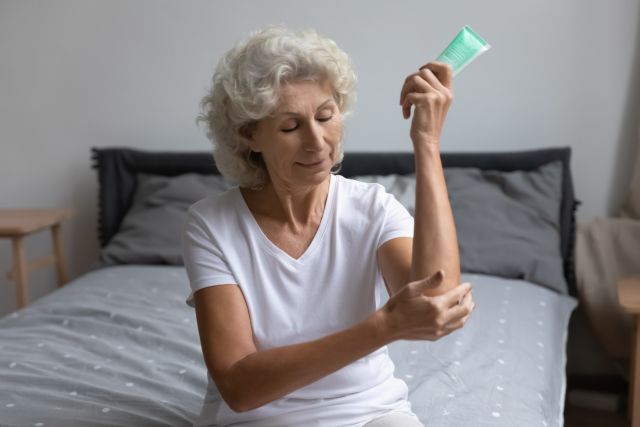Eczema affects 7 million adults and one-quarter of children in the United States. The chronic condition causes skin to become itchy, dry, red and inflamed. And according to one American Academy of Dermatology report, those dealing with the condition could have sleep problems and mental health issues like anxiety and depression.
Eczema is most common in children under the age of 2, and most people with eczema will resolve the disease in childhood, but for some individuals, it may be a life-long issue, says Vinod Nambudiri, MD, of Grand Strand Regional Medical Center in Myrtle Beach, South Carolina.
Dr. Nambudiri walks us through basic eczema info, common treatment plans and how you can take care of your skin at home.
Eczema symptoms and causes
Eczema is an umbrella term used to describe a chronic skin disorder. Typical eczema symptoms include dry, red, itchy patches of skin, rashes, as well as open sores.
There are many types of eczema, but atopic dermatitis, a chronic and inflammatory type of eczema, is the most common. Atopic dermatitis normally begins within the first six months of a baby’s life, but people may continue to experience flare-ups through adulthood. Atopic dermatitis can be the most severe type of eczema, causing extreme itching, and during flare-ups, open or crusted sores.
Two other common types of eczema include contact dermatitis and dyshidrotic eczema. Contact dermatitis occurs when the skin touches irritating substances or allergens; while dyshidrotic eczema can be caused by allergies or inappropriately moist skin. Both can be caused by exposure to nickel, chromium salts or cobalt. Less common forms of eczema include hand eczema, neurodermatitis, nummular eczema and stasis dermatitis.
While the exact cause of eczema is not known, dermatologists think that some forms of eczema might run in families. Experts also believe that people with asthma and people who live in polluted communities may be more at increased risk.
How to treat or prevent eczema flares
Depending on the severity of the eczema, your pediatrician, dermatologist or other healthcare provider (HCP) may recommend a variety of options, says Nambudiri. The best way to ease the discomfort of eczema: establish a healthy skincare routine and adopt skin-friendly habits at home. Here are some basic guidelines:
- Use a general daily moisturizer to help restore and protect the skin.
- Avoid super-hot water while bathing and showering; lukewarm water is best for preventing dryness.
- Use mild, scentless soap to gently cleanse the skin without exposing the skin to harsh chemicals that can make breakouts worse.
- Wear clothing that is soft and breathable, and try to avoid irritating fabrics like wool.
- Beware of irritants like animal dander and saliva, harsh cleaning products and dust lurking in your home. They can cause breakouts.
If you tend to have eczema flare-ups when you’re stressed, a psychologist can help you learn stress management techniques to avoid and cope with the hectic times.
For severe cases, your HCP may recommend topical eczema treatments such as corticosteroids and calcineurin inhibitors to decrease the inflammation. And if you have recurring infections, topical antibiotics will get rid of bacteria. Phototherapy, a treatment that involves exposing the irritated area to light, and alternative therapies like acupuncture and meditation may help, too.
Health complications caused by eczema
If you take good care of your skin and treat eczema flare-ups right away, it’s rare you’ll have any serious complications, but there are a few things you should watch out for.
The development of skin infections like impetigo and cellulitis are complications to keep an eye on, says Nambudiri. “Typically, these infections cause soreness, tenderness, draining fluid or blistering,” he adds. In rare cases these skin infections may cause a fever.
With eczema, itching usually becomes worse at night, and research shows that these sleep disturbances may lead to anxiety and depression issues down the road. Ask your healthcare provider about how you can control your nightly eczema symptoms in order to get more restful sleep.
People who have eczema should watch out for new allergy, asthma or hay fever symptoms. The exact connection is still unclear, but the American Academy of Dermatology report suggests that eczema-related inflammation may cause some of these allergy issues to develop. If you have any of these allergy symptoms, see your HCP to discuss the proper treatment.
Future eczema treatments
The good news is that dermatologists and researchers continue to investigate the eczema and the treatment options. “Treatments for eczema are an area of active research and investigation, with several newly designed drugs that target the immune system showing promise in the treatment of eczema,” says Nambudiri.
If you do have eczema, consider following the National Eczema Association for general eczema information, support group opportunities and awareness and research updates.


